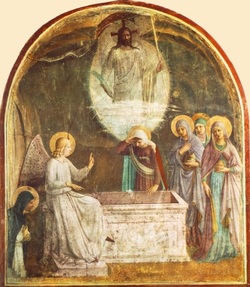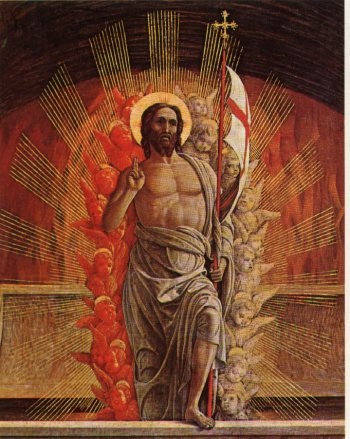
Sermon by St. Gregory the Pope
Dearly beloved brethren, ye have heard the deed of the holy women which had followed the Lord; how that they brought sweet spices to his sepulchre, and, now that he was dead, having loved him while he was yet alive, they followed him with careful tenderness still. But the deed of these holy women doth point to somewhat which must needs be done in the holy Church. And it behoveth us well to give ear to what they did, that we may afterward consider with ourselves what we must do likewise after their ensample. We also, who believe in him that was dead, do come to his sepulchre, bearing sweet spices, when we seek the Lord with the savour of good living, and the fragrant report of good works. Those women, when they brought their spices, saw a vision of Angels, and, in sooth, those souls whose godly desires do move them to seek the Lord with the savour of good lives, do see the countrymen of our Fatherland which is above
It behoveth us to mark what this meaneth, that they saw the angel sitting on the right side. For what signifieth the left, but this life which now is? or the right, but life everlasting? Whence also it is written in the Song of Songs: His left hand is under my head and his right hand doth embrace me. Since, therefore, our Redeemer had passed from the corruption of this life which now is, the Angel which told that his undying life was come, sat, as became him, on the right side. They saw him clothed in a white garment, for he was herald of the joy of this our great solemnity, and the glistering whiteness of his raiment told of the brightness of this holy Festival of ours. Of ours, said I? or of his? But if we will speak the truth, we must acknowledge that it is both his and ours. The Again-rising of our Redeemer is a Festival of gladness for us, for us it biddeth know that we shall not die for ever; and for Angels also it is a festival of gladness, for it biddeth them know that we are called to fulfil their number in heaven.
On this glad Festival Day then, which is both his and ours, the Angel appeared in white raiment. For as the Lord, rising again from the dead, leadeth us unto the mansions above, he repaireth the breaches of the heavenly Fatherland. But what meaneth this, that the Angel said unto the women which came to the sepulchre: Fear not? Is it not as though he had said openly: Let them fear which love not the coming of the heavenly countrymen; let them be afraid who are so laden by fleshly lusts, that they have lost all hope ever to be joined to their company. But as for you, why fear ye, who, when ye see us, see but your fellow-countrymen? Hence also Matthew, writing of the guise of the Angel, saith: His countenance was like lightning, and his raiment white as snow. The lightning speaketh of fear and great dread, the snow of the soft brilliancy of rejoicing.





